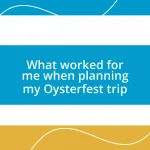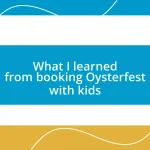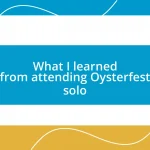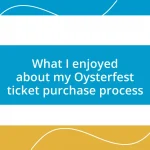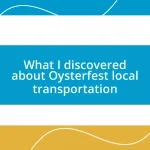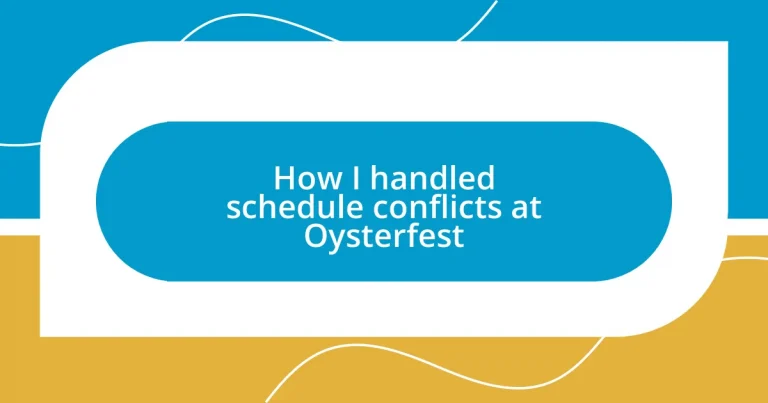Key takeaways:
- Identifying schedule conflicts through visual mapping and proactive communication enhances event planning efficiency.
- Understanding and clearly defining responsibilities fosters teamwork and smooth operations during events like Oysterfest.
- Implementing flexible plans and utilizing time management tools minimize stress and adapt effectively to unexpected changes.
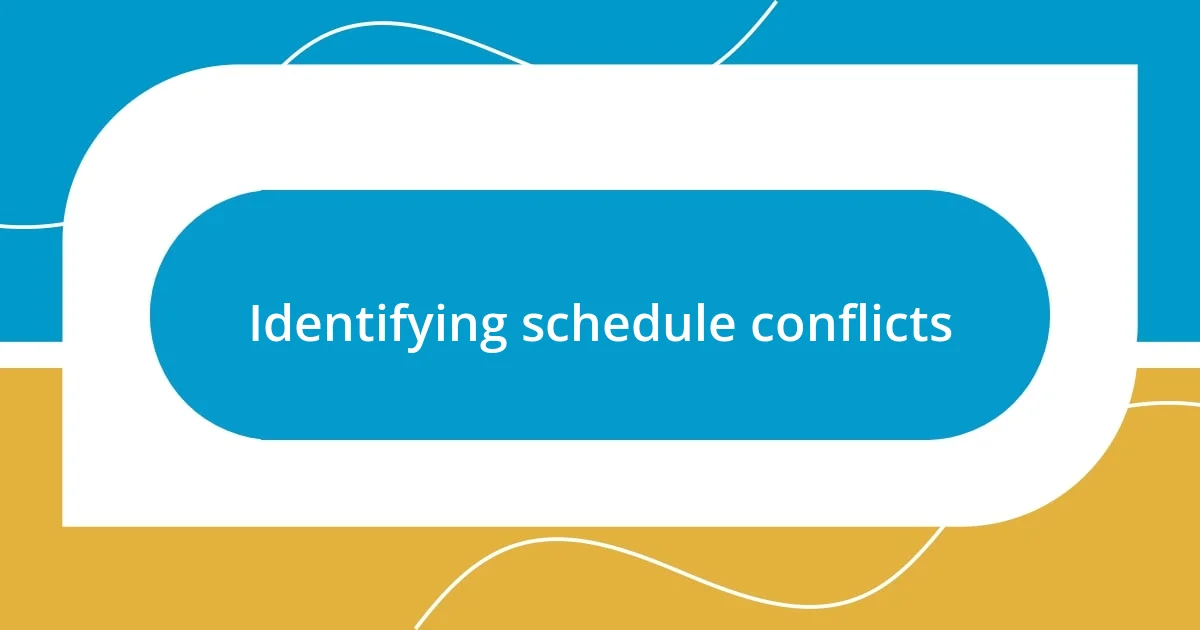
Identifying schedule conflicts
Identifying schedule conflicts often starts with a careful review of my commitments. I remember the time I had an overlapping obligation during Oysterfest preparations—a local fundraiser was scheduled for the same weekend. It was a sinking feeling when I realized I had to prioritize my responsibilities; have you ever faced a similar moment of realization that left you scrambling for solutions?
Once I became aware of my conflicting commitments, I found it helpful to map everything out visually. I pulled out my calendar, highlighting the key events in different colors. Seeing everything laid out made it easier to understand where I stood. This visual representation helped me quickly grasp the most pressing conflicts. Doesn’t it feel like a weight is lifted when you can see the chaos in front of you?
I also learned to proactively ask colleagues about their schedules early on. One year, I reached out to my team members before the festival planning kicked off, which allowed us to address potential overlaps before they became pressing issues. It’s incredible how open communication can ease the tension when juggling multiple responsibilities, right? I’ve found that a simple conversation can save a lot of stress down the line.
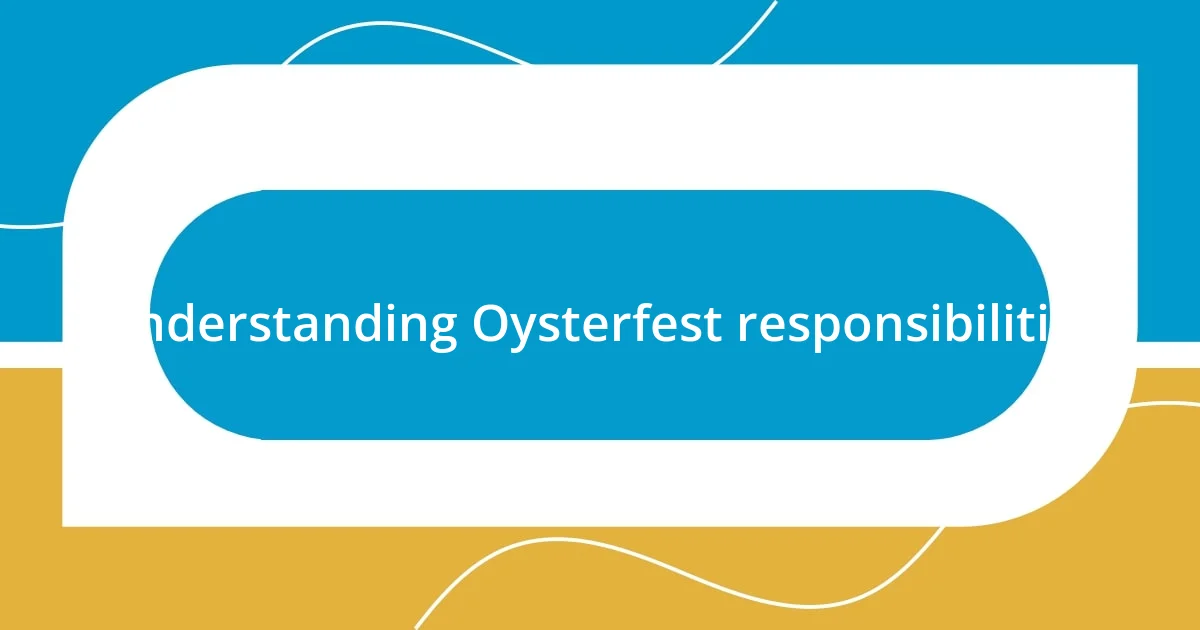
Understanding Oysterfest responsibilities
Understanding the responsibilities at Oysterfest is crucial for a seamless event. I’ve learned that each role contributes to the festival’s success, whether preparing food, managing volunteers, or coordinating entertainment. When we all understand our specific duties, everything seems to flow more smoothly. There was one year when I was tasked with overseeing the oyster shucking station, and the camaraderie among us volunteers made the long hours enjoyable and fulfilling.
Key responsibilities during Oysterfest include:
- Food Preparation: Ensuring all dishes are ready and meet health standards.
- Volunteer Coordination: Assigning tasks and keeping everyone informed.
- Logistics Management: Overseeing setup and takedown of event spaces.
- Guest Engagement: Interacting with attendees to enhance their experience.
- Safety Protocols: Ensuring all safety measures are in place for a secure environment.
I remember feeling a surge of responsibility when we encountered a last-minute substitution for our chef. Jumping in to help fill the gap not only tested my skills but deepened my appreciation for our team. Each role, no matter how small, plays a part in weaving the fabric of Oysterfest. The energy and teamwork we exhibited reminded me why I love being a part of this event.
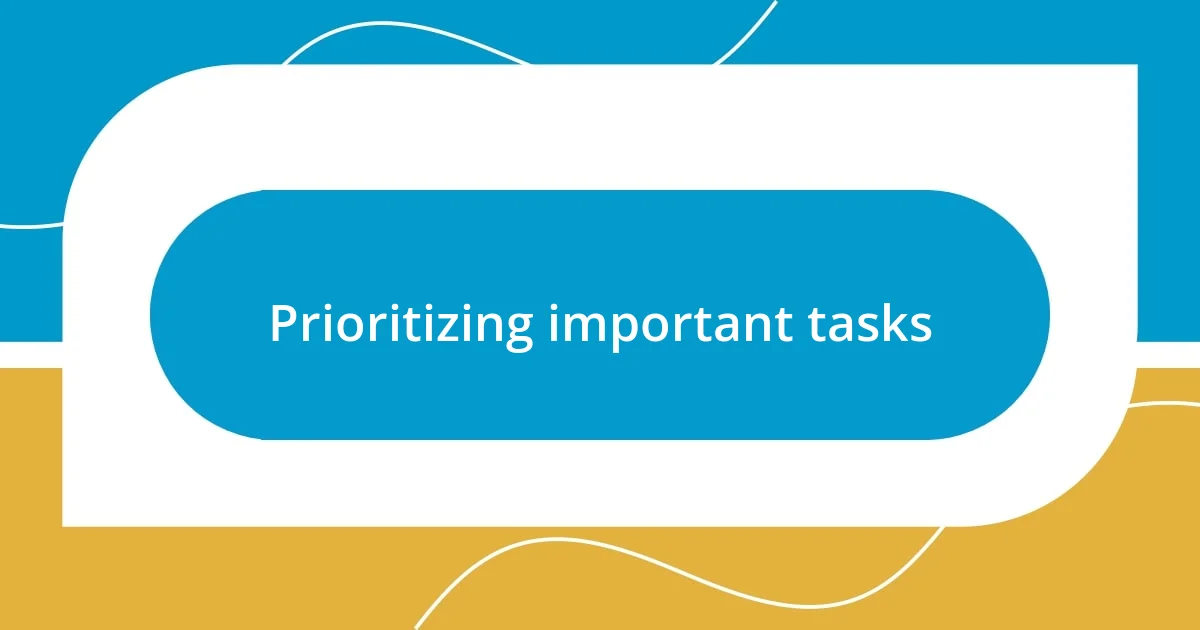
Prioritizing important tasks
When it comes to prioritizing important tasks at Oysterfest, I’ve always found that determining what truly needs my attention can make or break my experience. One year, I had to decide whether to focus on finalizing the vendor arrangements or address last-minute changes in entertainment. After weighing the impact of each task, I chose to solidify the vendor agreements first. The relief I felt afterward was indescribable—by affirming our food offerings, I set the foundation for guest satisfaction.
Another strategy I’ve implemented is evaluating deadlines. I remember the pressure of coordinating invitations for our special guests. By breaking down the task into smaller parts and highlighting what absolutely needed to be completed first, I managed to stay ahead. Each little achievement initiated a sense of accomplishment, which kept my motivation on an upward spiral. Do you ever tackle big projects this way? I find that checking off smaller tasks paves the way for the more daunting ones.
Sometimes, it’s about taking a breath and recognizing my limits. I once took on too much and found myself struggling to balance it all weeks before the event. This overcommitment taught me the importance of saying no when necessary. It’s a hard lesson, but stepping back allowed me to refocus on the most pressing tasks that aligned with my strengths, ultimately leading to a more successful festival experience.
| Factors for Prioritization | Examples from Oysterfest |
|---|---|
| Urgency | Finalizing vendor agreements before any other tasks |
| Impact | Ensuring guest satisfaction through food offerings |
| Deadline | Breaking down complex tasks like invitations |
| Personal Capability | Recognizing when to delegate or say no |
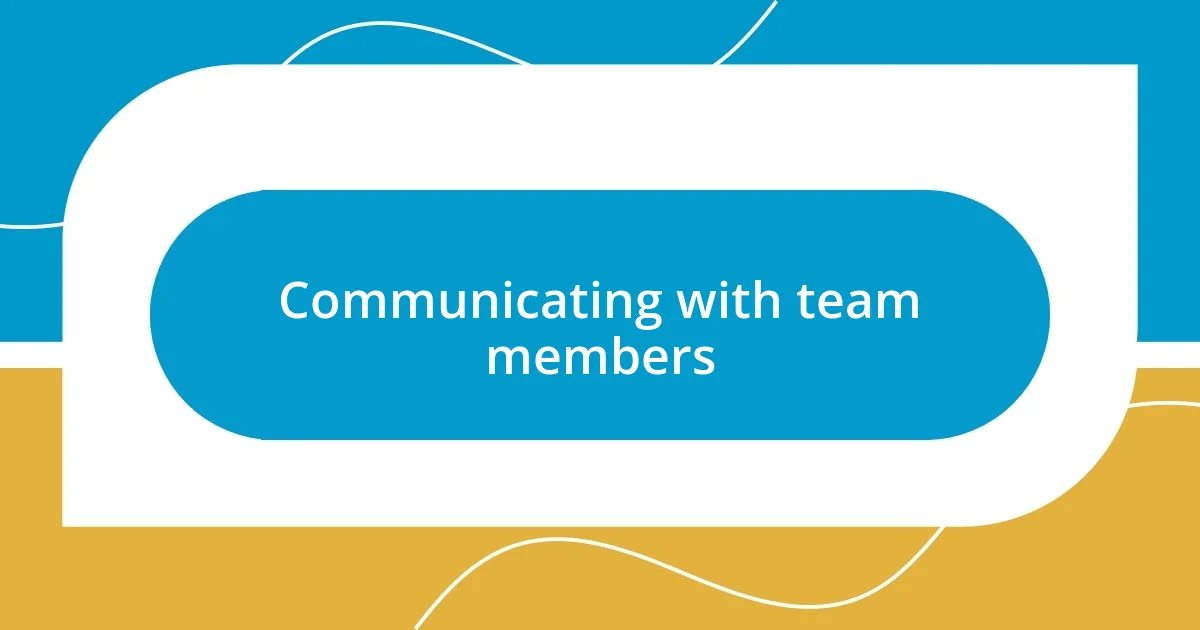
Communicating with team members
When it comes to communicating with my team at Oysterfest, I’ve realized that clarity is essential. One year, I decided to implement pre-event check-ins, where we could all discuss our roles and any potential conflicts. These sessions not only cleared up confusion but also built a sense of camaraderie among us. Have you ever felt that spark of connection with your teammates? I cherish those moments when we align our intentions, creating a strong support network.
During the festival, I made it a point to encourage open dialogue among my team members. For instance, when someone had a conflict with their shift, rather than simply stressing about it, we collaborated on finding a solution. This not only boosted morale but reinforced the idea that we’re all in this together. There’s a unique energy that comes from being part of a group that shares both responsibilities and challenges. Don’t you think that teamwork truly shines when everyone feels heard and valued?
Lastly, I learned the importance of using tools that facilitate communication. Using a shared messaging platform helped us stay updated on shifts and any last-minute changes. I remember receiving an alert just before my shift started regarding a food allergy that needed to be addressed. Thanks to our quick communication, we handled it smoothly without causing any panic. It’s amazing how a little technology can enhance our ability to work together and keep everyone safe.
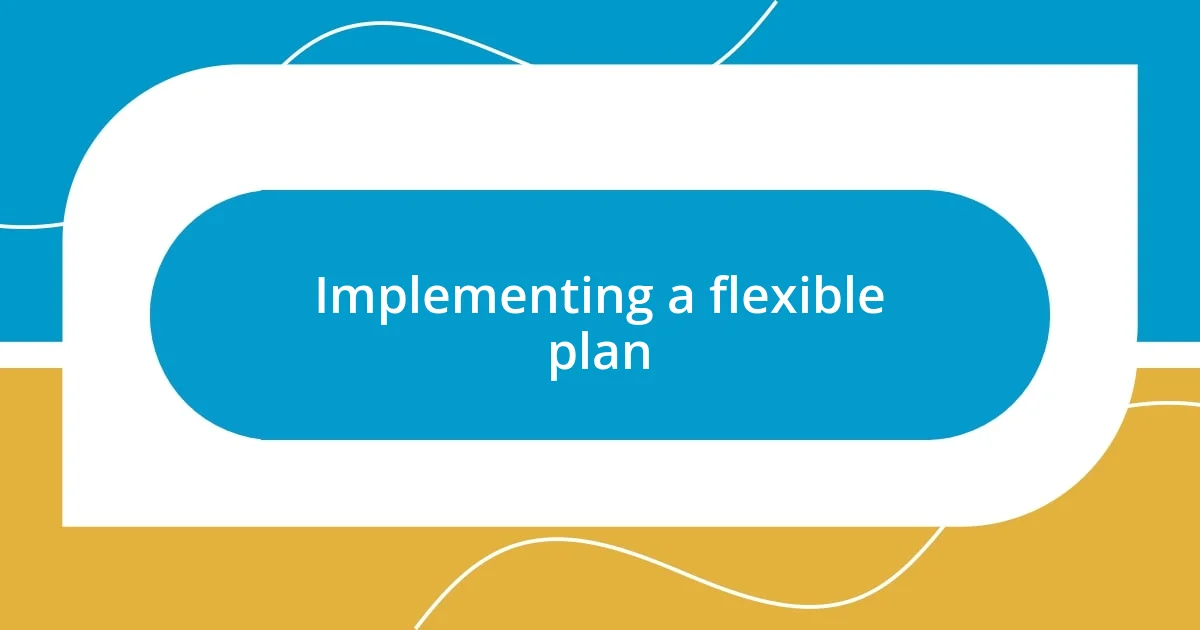
Implementing a flexible plan
Implementing a flexible plan at Oysterfest has been a game changer for me. I often find that being open to changes—like adjusting staff roles or shifting schedules—can alleviate stress. Once, a sudden rainstorm forced us to move our activities indoors. Thankfully, we’d prepped for contingencies and had a plan for shifting vendors and entertainment. The moment I saw smiles on guests’ faces despite the weather, I knew our flexibility paid off. Have you ever had to pivot on a dime during a big event?
In my experience, it’s crucial to build a framework that allows wiggle room. During the festival, I created a master schedule that outlined key tasks but included “buffer times” for unexpected hiccups. I remember when a vendor arrived late; instead of panicking, I adjusted nearby timelines and reassigned some team members to help. This adaptability not only kept us on track but also fostered a sense of teamwork and trust. Isn’t it reassuring to know that plans can adapt rather than break under pressure?
Reflecting on my approach, I realize that a flexible plan is less about rigidity and more about being proactive. At Oysterfest, I encouraged my team to brainstorm potential issues ahead of time. When faced with scheduling conflicts, we collectively brainstormed solutions, which often led to innovative ideas that I hadn’t initially considered. For example, we had a last-minute music act drop out, and rather than scramble, we brought in local talent to fill the gap. This unexpected change not just salvaged our lineup but also energized our audience. Doesn’t it feel fantastic when challenges become opportunities?
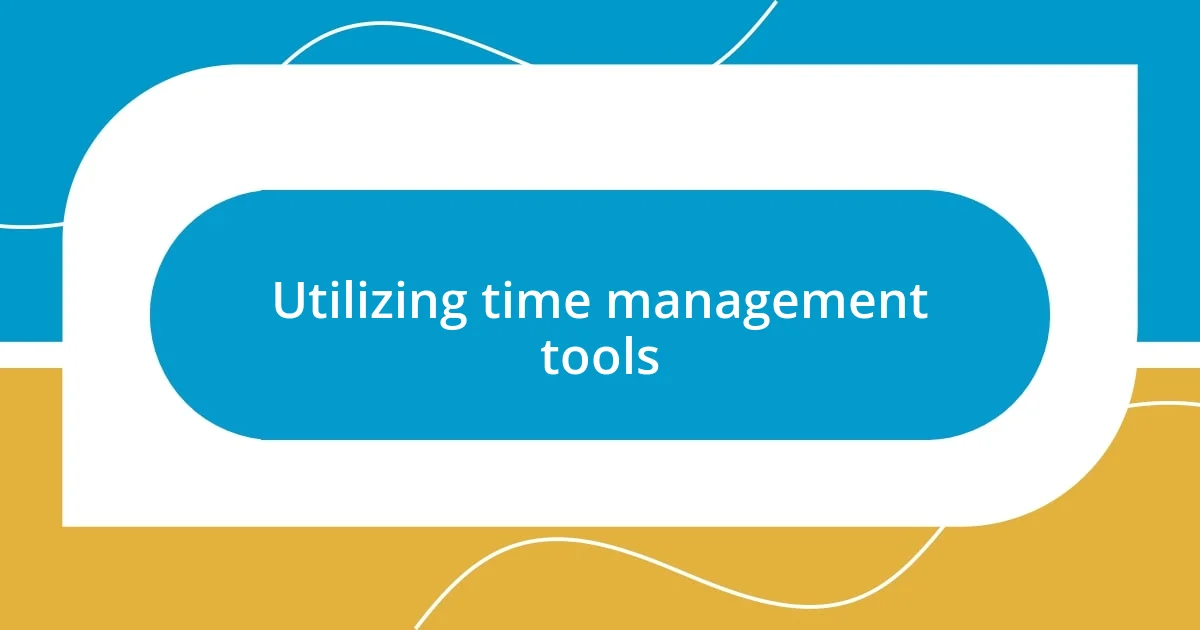
Utilizing time management tools
Utilizing time management tools has been essential in navigating schedule conflicts at Oysterfest. I’ve always found digital planners, like Google Calendar, invaluable. When pulling together our schedules, I would color-code shifts so that team members could easily recognize their responsibilities at a glance. Have you ever felt the relief of seeing everything laid out neatly? It’s like having a roadmap that guides us through the chaos of event planning.
During one memorable festival, I tested out a project management app to assign tasks and deadlines. The result? A tangible decrease in last-minute confusion. I recall a particularly hectic afternoon when a handful of volunteers suddenly couldn’t make it. Instead of feeling overwhelmed, I quickly updated our app, and within minutes, I had reassigned roles while keeping everyone in the loop. How amazing is it when technology transforms a potential disaster into a smooth transition?
I also learned the value of keeping a physical planner on hand. There’s something so satisfying about crossing off completed tasks. I remember one year, I had to juggle setup, coordination with vendors, and staff adjustments all in one day. My planner became my trusty companion, where I could jot down changes and reminders. It grounded me amidst the whirlwind. Have you ever experienced the calming effect of writing things down? For me, that simple act turned my chaotic thoughts into manageable pieces, allowing me to focus on the event rather than drowning in it.
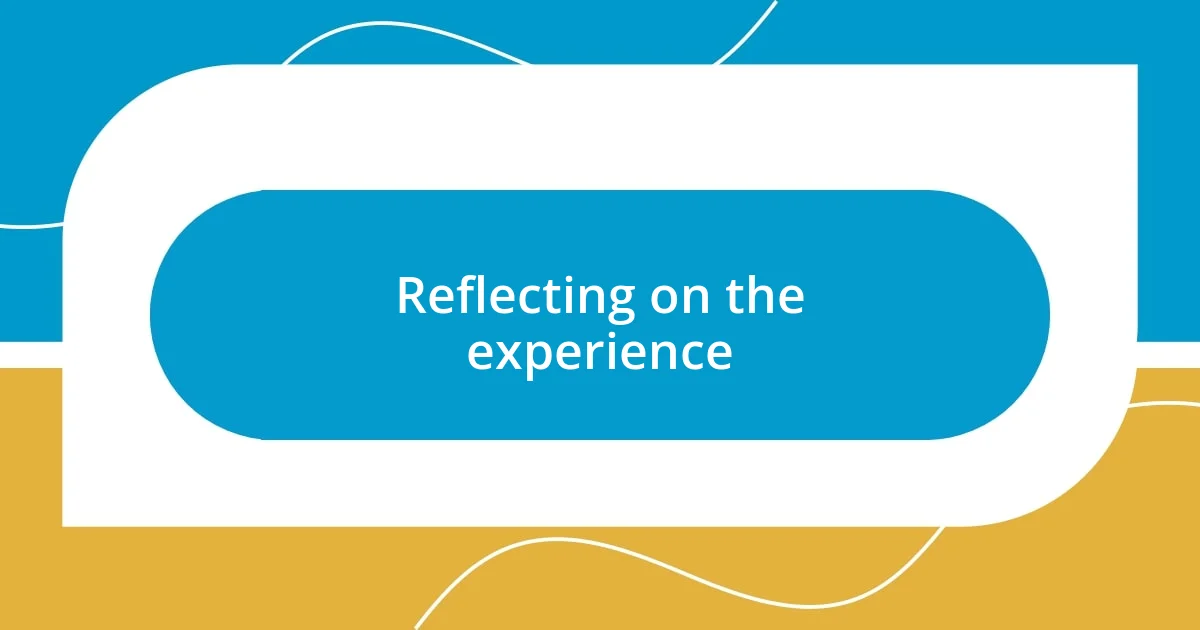
Reflecting on the experience
Reflecting on this experience, I can’t help but feel a sense of accomplishment. Each conflict we faced during Oysterfest taught me valuable lessons about flexibility and teamwork. I remember the adrenaline rush when, out of nowhere, a performer canceled last minute. Instead of spiraling into panic, I gathered our staff and we turned that moment into a creative brainstorming session. It’s incredible how collaboration can transform a stressful situation into an exciting opportunity for innovation. Have you ever found strength in numbers during a challenging moment?
There’s also something deeply rewarding about seeing how our efforts paid off. When things went awry, the team rallied together, bringing their unique strengths to the table. I vividly recall the moment when we managed to switch a canceled vendor with a local food truck within hours. The smiles on our attendees’ faces as they enjoyed the tasty offerings made all the chaos worthwhile. In times of trouble, it’s those unexpected victories that really resonate with me. Don’t you think those moments of triumph are what make the hard work truly fulfilling?
Looking back, I realize that every hiccup at Oysterfest led to deeper personal insights—not just about logistics, but about leadership and connection. The festival wasn’t merely a series of events; it was a reflection of building relationships and trust. On a particularly chaotic day, as I stood by the main stage watching people enjoy the atmosphere we created, I felt a sense of pride swell within me. Have you ever paused to appreciate the collective effort that makes events like these possible? For me, that was a powerful reminder of why I love this line of work: it’s all about community.


